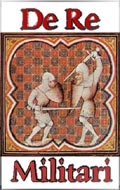
De Re Militari | Book Reviews
Paul E. J. Hammer
Warfare in Early Modern Europe 1450-1650
The International Library of Essays on Military History 39 (Aldershot, Hants., U.K.: Ashgate, 2007), 468pp. $250.00 ISBN 9780754625292.

Ashgate’s International Library of Essays on Military History has produced thus far four useful volumes that reprint significant articles on medieval military history, edited by distinguished scholars such as Susan Rose, Kelly DeVries and John France. The series now ventures into early modern European warfare with a collection edited by Professor Paul E. J. Hammer, the newly-hired Director of the Center for British Studies at the University of Colorado (Boulder). With a list of more than thirty-four volumes, the ILEMH has made available, between hard covers, hundreds of articles from disparate, sometimes mildly arcane, periodicals. Hammer selects seventeen previously published, historiographically significant, essays that appeared between 1973 and 2002, and weaves them together thematically. His twenty-five page introduction is a brisk and insightful historiographical review of the field, and the editor skillfully places each contribution in its proper niche. Further cohesiveness is provided by an index. Indeed, the indexes of the International Library of Essays on Military History are an obvious selling point. One may cull through a score or so of the best articles in a fashion that cannot be achieved when consulting works in printed journal form.
For the most part the book succeeds in fulfilling the vision of series editor Jeremy Black, who emphasizes cultural over material aspects of military history (though Hammer balances the former and latter nicely). The volume is particularly revealing of one of Black’s favorite areas of inquiry, namely the nature of “strategic cultures”, reflected in this volume by Weston Cook on the use of artillery in the Reconquista and George Raudzens’ investigation of the conquest of the Aztecs. While the inevitable pieces on the military revolution debate appear (by David Parrott, Geoffrey Parker, Clifford Rogers, etc.), material culture topics such as artillery, fortification and related technological issues also stand out. Perhaps half a dozen articles are directly relevant to the military revolution, though the editor stresses that this collection is much broader in focus than that well-documented debate. Indeed, the military revolution, in these pages, is important only insofar as it is a major component of the historiography. In addition to the above-mentioned historians, contributors featured are Gervase Phillips, Simon Pepper, David Potter, Fernando Gonzalez de Leon, M. D. Feld, John Nolan, Gabor Agoston, David Trim, and Quentin Outram.
The utility of Warfare in Early Modern Europe is that it compacts essays that one finds cited frequently, or perhaps one hasn’t got round to reading yet. It is indeed a handy volume in that it provides a representative cross-section of the literature of the field. The promise that this book offers for undergraduate instruction, however, is undermined by its cost. Additionally, Ashgate hasn’t done its best production work. The binding is weak and the reprographics poor. Cook’s marvelous article is painfully difficult to read because of the mottled script. The poor resolution of the print reveals a degree of careless production (for example, there is no publication date given, save in the Library of Congress call number). It is ironic that a Press should recruit stellar editors but scrimp on the physical production of the volumes. As a result, the book is destined to become a reference work, and that is a shame because as the latter it competes with electronic data bases. Articles, even monographs, are increasingly convenient to download, and can be enlarged for ease of reading. What we could have used was an affordable paperback textbook that combines the historiographical dimension with specimens of both classic and recent work, in the latter case that exhibit innovative historical methodology and new concepts. But then one should never criticize a book for what it does not presume to be, and the editor was necessarily constrained by the series format. Nevertheless, we should congratulate Professor Hammer on the appearance of the volume as well as his new appointment in Boulder.

Mark Charles Fissel
The Augusta Arsenal, Georgia, U.S.A. <[email protected]>
Page Added: March 2008